the history of yeovil's pubs
PUBS HOME PAGE |
PUBS INTRODUCTION |
PUBS BY NAME |
BEERHOUSES |
wellington inn
28 Wellington Street
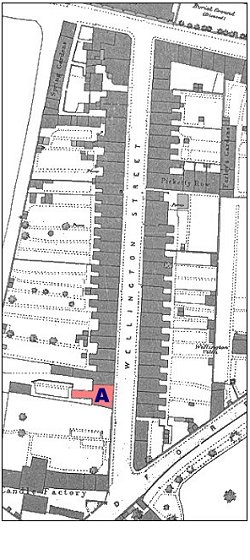 Not
really much to
say about the
Wellington Inn,
it was
two-thirds
of the white
building in the
photo
below and the
plans show it
had a servery
with a wall
hatch to the
bar, a smoke
room and a
private room
which was
probably the
private living
room for the
landlord and his
family since
upstairs there
were just four
bedrooms. There
was a rear
entrance to the
Wellington,
accessed from
Salthouse Lane.
Not
really much to
say about the
Wellington Inn,
it was
two-thirds
of the white
building in the
photo
below and the
plans show it
had a servery
with a wall
hatch to the
bar, a smoke
room and a
private room
which was
probably the
private living
room for the
landlord and his
family since
upstairs there
were just four
bedrooms. There
was a rear
entrance to the
Wellington,
accessed from
Salthouse Lane.
The map at left shows the Wellington Inn, marked 'A', and the whole of Wellington Street joining Huish at the top and West Hendford at the bottom.
In 1901 the Minutes of the Fire Brigade recorded the following
|
"On October 25th called to a Fire at Wellington Inn, Wellington Street, the following attended - Lieut. Brown, Foreman Cridland, Firemen Mitchell, Rundle, Denner, Moore and Engineer Brown. By order of Captain a charge of £1.1s.0d. was made." |
The following article appeared in the Daily Herald of 25 January 1949 -
|
"At the Wellington Inn, kept by popular Nick Collins, the Yeovil team captain, they introduced me to Yeovil's most popular game - real skittles. You hurl a wooden ball about the size of a large grapefruit some thirty yards down a wooden alley and knock down nine pins (the centre pin is called 'the Landlord'). It is sweaty, thirst-making work. By comparison, darts is a sissy game. In the district there are about 500 skittles teams, 4,000 players. There are also cribbage and darts leagues." |
To watch a video of the 1949 Yeovil FA Cup Team drinking and playing skittles in the Wellington Inn - click here. (Thanks to Rob Baker for the link) and there are a couple of stills below.
The Wellington Inn was owned by Brutton's Brewery, later Brutton, Mitchell Toms Ltd. Most of Wellington Street, including the Wellington Inn, was demolished around 1968 to clear the area for the construction of the Wellington Street flats.
|
Yeovilians remember.... Many thanks to Tony Robins for the following - "Many of Yeovil's pubs were quite small. The Wellington Inn for instance, in Wellington Street, was only a tiny little room with a hatch in one wall. Beer was passed through the hatch from the kitchen which was used as a tap room. The Market Street Inn was the same." |
![]()
James Wright was born in 1811 in Chelsea, Middlesex. I first found him in the records in the 1851 census where, as an unmarried 40-year-old carpenter and joiner, he was living in Coronation Buildings. In the summer of 1855 he married Elizabeth Adams and by 1859 they were living in the Wellington Inn where James was listed in Harrison, Harrod & Co's 1859 Directory. In the 1861 census James, by now aged 50, was living at the Wellington Inn with Elizabeth, her widowed mother Mary Adams aged 82 and his niece Mary Adams aged 12. James still described his occupation as 'carpenter & joiner '. Kelly's Directory of 1866 listed James as a beer retailer in Wellington Street but he died in the autumn of 1868. It would seem that Elizabeth moved on after James's death since by 1871 there was a new licensee at the Wellington Inn.
George Vickery was born in 1831 at Nether Compton and in the 1841 census was listed living with his parents, grocer John Vickery (1801-1890) of Vicarage Street and his wife Hannah née Hake (1806-1862), a dressmaker, and several siblings. In the spring of 1852 George married Letitia and in the 1861 census George, aged 30 and described as a glove cutter / leather, was living in Park Street with Letitia and four of their young children; Henry, Lucy, Lydia, and Benjamin, all aged under 7. In 1869 George Vickery "of the Wellington beerhouse" was summoned under the new Beerhouse Act for having his house open for the sale of drink during prohibited hours, on Sunday 8 August. He was fined £1. George was last recorded at the Wellington Inn in the beer retailers section of Kelly's 1875 Directory. By the time of the 1881 census George and Letitia were living in north Barnstaple with five of their children. George described his occupation as a glover. He died in Barnstaple in 1907 aged 76 and Letitia died in 1910.
Thomas Gwynne was born in the spring of 1852 at Haverfordwest, Pembrokeshire. In the 1871 census 19-year-old Thomas was a cabinetmaker's apprentice and was living in Pembroke with his older cabinetmaker brother John and his wife Esther. In the autumn of 1878 Thomas married Mary Perry in Yeovil. She was the 18-year-old daughter of Henry Perry and Martha née Hallett of Crewkerne. By the time of the 1881 census Thomas and Mary, together with their 10-month-old son Stanley and Mary's 12-year-old sister Minnie, were listed at 28 Wellington Street - the Wellington Inn, albeit unnamed. In 1882 Thomas was listed in Whitby's Yeovil Almanack Advertiser as running the Wellington Inn at 28 Wellington Street. By 1888 Thomas had moved his family to Ealing, London, where daughter Beatrice was born. Sadly Thomas died there in the summer of 1888 at the age of 37 and Mary returned to Yeovil with the children. The 1891 census recorded Mary, a 32-year old widow working as a glover, with the children and living at 77 Huish.
The next licensee, George Alfred Dimond, was born in early 1854 in Yeovil, the son of wagoner Solomon Dimond and his wife Elizabeth Ann née Bartlett. In the 1871 census the family, including four of George's siblings, were living in Chants Path, where 17-year-old George gave his occupation as a plumber. In the spring of 1874 George married Susan Hewlett, daughter of glover German Hewlett and his wife Susanna, in Yeovil. George and Susan's son, also named George, was born the same year. By 1881 George and Susan had moved to London and were living in Goodge Street, St Pancras, where George was working as a plumber. By 1889 the family had returned to Yeovil and George was listed as a beer retailer in Kelly's Directory of 1889. In the 1891 census George and Susan were living at the Wellington Inn (although there was no sign of son George) and George gave his occupation as a plumber & publican. Certainly by 1897 George and Susan had left the Wellington Inn and the 1901 census found 47-year-old George the innkeeper of the Half Moon Inn at Mudford. By the time of the 1911 census George and Susan were living at, and running, the White Post Inn at Rimpton where George was recorded as a 'beer house keeper' (you'll be pleased to learn that their son George although still not living with them was recorded as 'still living '). George died in 1923 aged 69.
The next licensee was Job Mitchell. Job was born in Fordington, near Dorchester, Dorset, around 1868. He was the son of a journeyman blacksmith, Joseph Mitchell, and his wife, Sarah. Between 1897 and 1912 Job was licensee of the Wellington Inn. In the 1901 census he described his occupation as 'carpenter and inn keeper' and lived in the Wellington with his wife, Sarah, and their three children and by the 1911 census the only difference was that Job described his occupation as carpenter. By 1914 he was licensee of the Britannia Inn in Vicarage Street, where he was to remain until at least 1923.
After Job Mitchell left the Wellington Inn for the Britannia Inn, John Balch was noted as its beer retailer in Kelly's directory of 1914. I couldn't find John Balch in any census records but I assume that he died in 1914 and his son William took over the license. Again I couldn't find the correct William Baulch in any census records but it appears that he was only the licensee of the Wellington Inn between 1915 and 1919 after which the Wellington Inn was run (presumably) by his widow, Mrs Emily Baulch, until 1938.
Sketch Plan of the WELLINGTON Inn
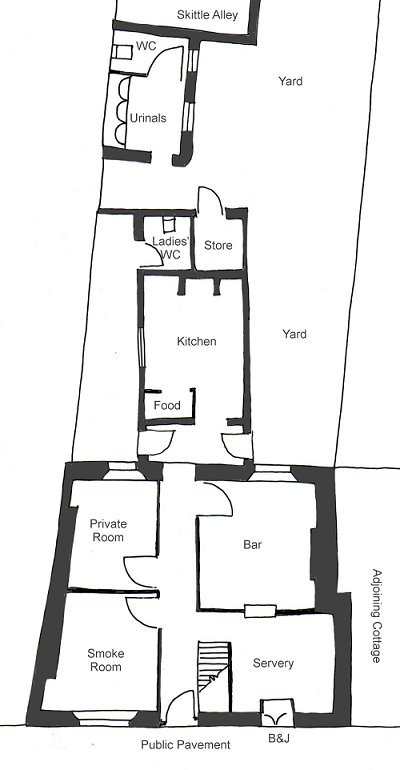
This is a sketch based on plans held at the Heritage Centre, Taunton. The original plans are dated 1939, when Brutton, Mitchell Toms Ltd were the owners. The range of buildings from the kitchen to the skittle alley were all single-storey, chiefly lean-to, buildings. Presumably the 'private room' was also a drinking area. 'B&J' shows the 'Bottle & Jug' off sales, which is the taller of the two doors in the photograph below. Notice that the counter from the servery to the bar was simply a hatch in the wall - typical of many smaller pubs of the time.
gallery
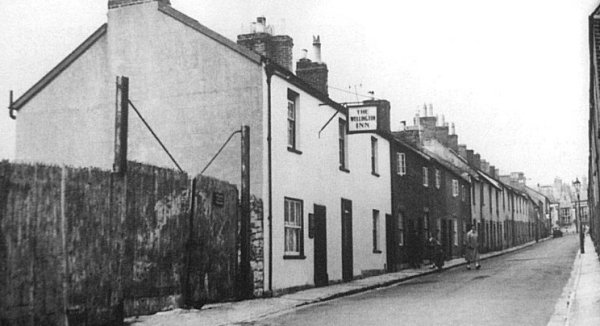
The Wellington Inn, about 1950, looking towards Huish with Huish County Infants School (now part of Tesco's complex) just visible at the end of the road. The white building at centre is the Wellington Inn (with two first floor windows) and the adjoining cottage (one first floor window).
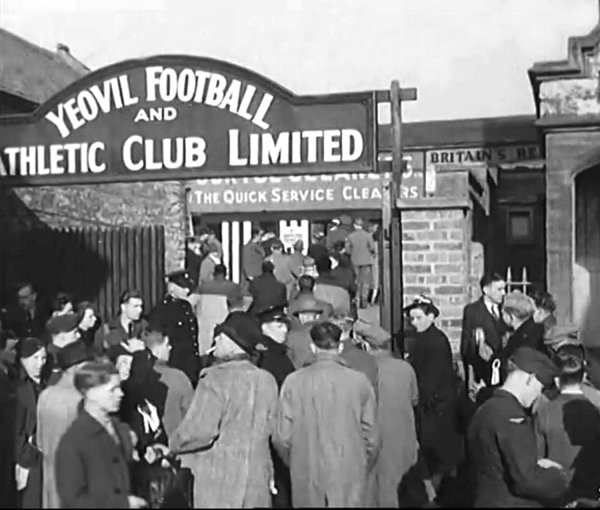
Fans queue to get into the Huish ground for the Yeovil Town v Sunderland match. The game was played on 29 January 1949 and was a tie in the Fourth Round of the FA Cup. Yeovil Town won the match 2–1, with Alec Stock and Eric Bryant scoring the goals for the winning side. The match is notable for being one of the few occasions in the history of the FA Cup where a non-league club has defeated a team in the top tier of English football.
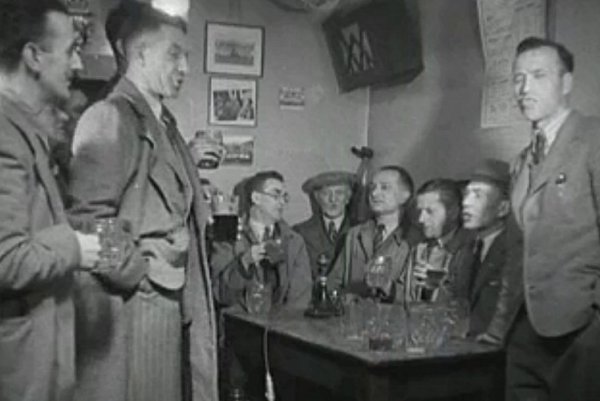
Some of the 1949 Yeovil FA Cup Team drinking and singing the Glover's anthem with locals in the Wellington Inn where the Glovers' captain, Nick Collins, was licensee.
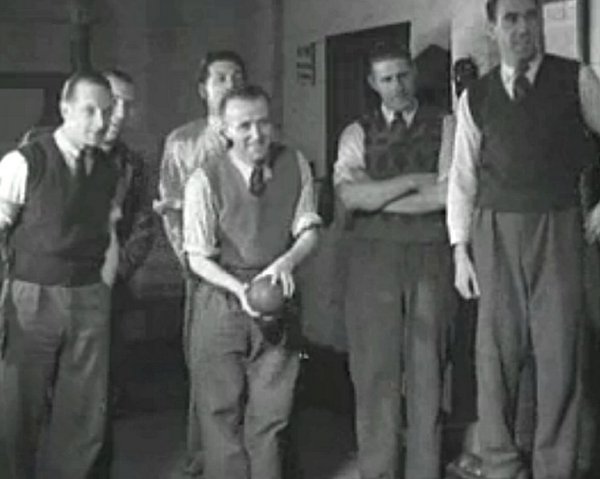
Some of the 1949 Yeovil FA Cup Team playing skittles in the Wellington Inn.
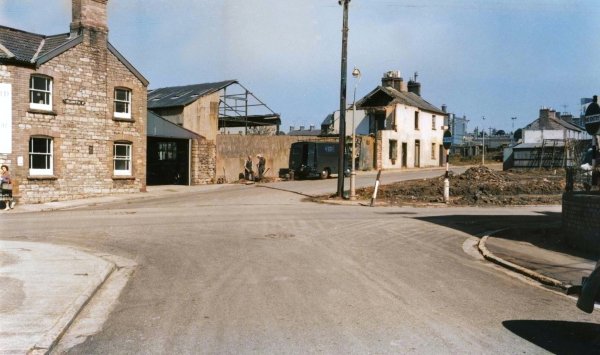
From the
Cave
Collection
(colourised),
Courtesy of South Somerset Heritage Collection
This photograph was taken around 1968 when Wellington Street was being demolished to make way for the Wellington Flats. The photograph was taken from Hendford Grove with West Hendford running across the photograph and Wellington Street, on the opposite side of West Hendford from the buildings at left to the demolition works towards top right. The buildings at left were Taylor's paint store and had been a 19th century candle factory, seen at the very bottom of the map above. The white building to the right of the telegraph pole at centre is the Wellington Inn being demolished.
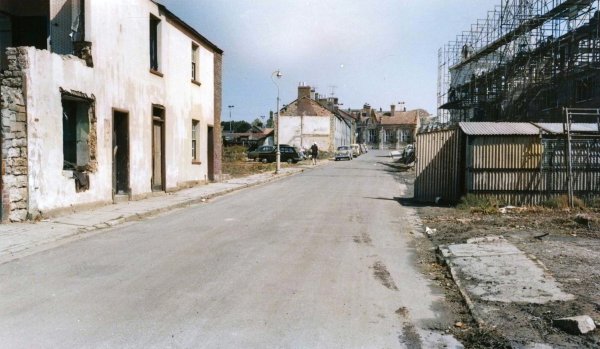
From the
Cave
Collection
(colourised),
Courtesy of South Somerset Heritage Collection
An enlargement of the central section of the previous photograph looks along Wellington Street and shows the Wellington Inn being demolished at left. Like a phoenix rising from the ashes of Wellington Street, the new Wellington Flats take shape at right. At the far end of the road is Huish County Infants School, now part of Tesco's.
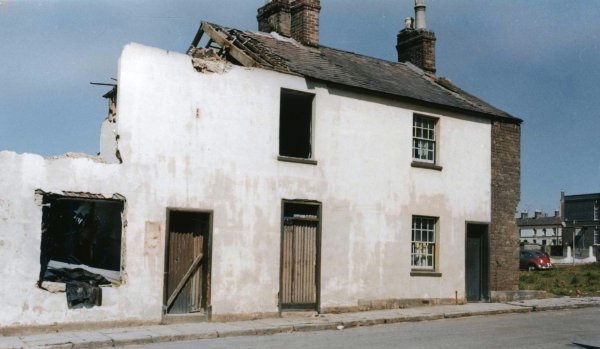
From the
Cave
Collection
(colourised),
Courtesy of South Somerset Heritage Collection
... and the Wellington Inn, halfway through demolition around 1968.
licensees
1859 – James
Wright
(Harrison,
Harrod & Co 1859
Directory) as
Wellington,
Wellington
Street
1861 – James
Wright –
Carpenter and
Joiner (1861
census) listed
as Wellington
Inn
1866 – James
Wright – Beer
Retailer
(Kelly's 1866
Directory)
listed as
Wellington
Street
1871 – George
Vickery,
Carpenter (1871
census)
1872 – George
Vickery – Beer
Retailer
(Kelly's 1872
Directory)
1875 – George
Vickery (Kelly's
1875 Directory -
Beer Retailers)
listed as
Wellington
Street
1882 – Thomas
Gwynne (Whitby's
1882 Yeovil
Almanack
Advertiser)
listed as
Wellington Inn,
28 Wellington
Street
1889 – George
Dimond – Beer
Retailer
(Kelly’s 1889
Directory) pub
not named
1891 – George
Dimond – Plumber
& Publican (1891
census) pub not
named
1897 – Job
Mitchell – Beer
Retailer
(Kelly’s 1897
Directory) pub
not named
1898 – Job
Mitchell
(Whitby's 1898
Yeovil Almanack
Advertiser)
1901 – Job
Mitchell –
Carpenter &
Innkeeper (1901
census) pub not
named.
1912 – Job
Mitchell
(Whitby's 1912
Yeovil Almanack
Advertiser)
1914 – John
Balch – Beer
Retailer
(Kelly’s 1914
Directory) pub
not named
1915 – William
Baulch (Whitby's
1915 Yeovil
Almanack
Advertiser)
1916 – William
Baulch (Whitby's
1916 Yeovil
Almanack
Advertiser)
1919 – William
Baulch – Beer
Retailer
(Kelly's 1919
Directory)
listed as 28
Wellington
Street
1923 – Emily
Baulch – Beer
Retailer
(Kelly’s 1923
Directory) pub
not named
1926 – Mrs Emily
Baulch – Beer
Retailer
(Kelly’s 1926
Directory)
listed as
Wellington Inn
1935 – Mrs E
Baulch (Kelly’s
1935 Directory -
Beer Retailers)
listed as 28
Wellington
Street
1936 – Emily J
Balch (1936
Yeovil
Directory)
listed as
Wellington Inn
1938 – Emily
Balch (1938
Yeovil
Directory)
listed as
Wellington Inn
1939 – EJ Jeans
(Kelly’s 1939
Directory)
listed as
Wellington Inn
1947 – EJ Jeans
(1947 Yeovil
Directory)
listed as
Wellington Inn
1949 – Nick Collins
(Kelly’s 1949
Directory)
listed as
Wellington Inn
1951 – N Collins
(1951 Yeovil
Directory)
listed as
Wellington Inn
1954 – Nicholas
Collins (Snell's
1954 Directory)
1957 – WJ
Russell (1957
Yeovil
Directory)
listed as
Wellington Inn
1960 – WJ
Russell (1960
Yeovil
Directory)
listed as
Wellington Inn
1965 – Licensee
not named (1965
Yeovil
Directory)
listed as
Wellington Inn